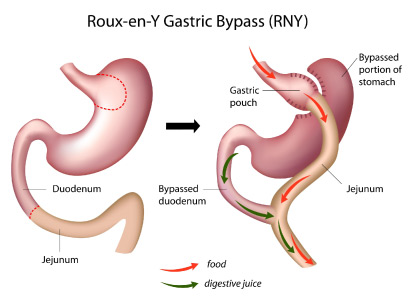The History of Gastric Bypass Surgery
Specific weight loss interventions have often been reported throughout history. However, before the 1950s, these procedures were only performed on a select few, and usually, any weight loss experienced was a side effect of another surgery completely. Weight loss surgery, and gastric bypass specifically, was not taken seriously as a procedure until the obesity epidemic became apparent in the late 1990s.


(Image from ObesityCoverage.com)
When obesity became not “simply a weight problem” but a chronic condition affecting the entire body, the surgical community started to take note. With obesity on the rise and a lack of solutions to the problem, the rise in gastric bypass surgeries began to soar. Today, it is estimated that more than 256,000 people undergo surgeries each year to help manage and overcome their obesity concerns and the health-related problems it leaves in its wake.
What is Gastric Bypass Surgery?
The Roux-en-Y Gastric Bypass, typically called “gastric bypass,” is a weight loss surgery that has now been performed for more than 50 years. It is one of the most common weight-loss operations and is extremely effective in treating obesity and obesity-related diseases.


Gastric bypass surgery is a procedure that modifies your small intestine and stomach – making changes to these organs and affecting how your body absorbs and digests food. This type of surgery is typically performed with a combination of minimally invasive techniques using laparoscopic technology and small incisions.
This advancement to this process creates a more comfortable experience for patients and has shown an overall improvement in complications, recovery, and fewer pain symptoms. While gastric bypass surgery carries some risks and side effects, the complication rates are much lower than other standard health procedures and lower still than those who do not seek intervention for their weight-related problems.
How Do You Perform Gastric Bypass Surgery?
To perform gastric bypass surgery, the surgeon creates a small stomach pouch. This is done by stapling part of the stomach. After this step, the surgeon attaches a section of the small intestine to the newly created pouch, creating a bypass for the food, so it skips part of the small intestine.
The small stomach pouch created through gastric bypass surgery can only hold a single ounce of food. In comparison, a standard adult stomach can hold 2.5 ounces of food when it is empty, and it can expand to hold roughly 1 quart of food when it is full. The results of this smaller stomach and shorter pathway through the intestines aids in weight loss in the following ways:
- A smaller stomach size reduces the amount of food it can hold.
- The rerouting of the food produces changes in gut hormones that promote satiety and suppress hunger.
- The added bypass limits calories that your body can absorb.
Who Is A Gastric Bypass Candidate?
There are a multitude of qualifications that must be met to be a gastric bypass candidate. While obesity is a qualification, it is not the only way a person can have gastric bypass.
The candidate must meet a long list of criteria , including blood tests, medical imaging, specific BMI requirements, percentage of body fat or have a severe obesity-related illness.
Additional Types of Bariatric Surgery
While the Roux-en-Y bypass is the longest-performed bariatric surgery, there are other types of bariatric surgery that people can explore for their weight loss needs. These additional types include:
- Gastric Sleeve
- Gastric Plication
- Gastric Lap Band
- Mini Gastric Bypass
- Duodenal Switch
- Revision Surgery
Each bariatric procedure offers its own unique benefits and risks. Individual factors such as age, health, and preference, all play into deciding which bariatric surgery is the right course of action.
Where Can You Get Bariatric Surgery?
Many medical centers all over the world provide successful bariatric surgery and at VIDA Bariatrics in Tijuana, Mexico, we pride ourselves as being a part of this group. At our clinic, we offer a wide range of different bariatric surgeries and are confident that we can support your weight loss needs.
We offer a free weight loss surgery virtual consultation to identify your needs and for you to meet our team before you make the trip to Tijuana. We also provide budget-friendly quotes and ensure that each of our patients has access to the best bariatric surgery fit for their needs.
Next steps? Schedule a Virtual Weight Loss Surgery Consultation by going here.